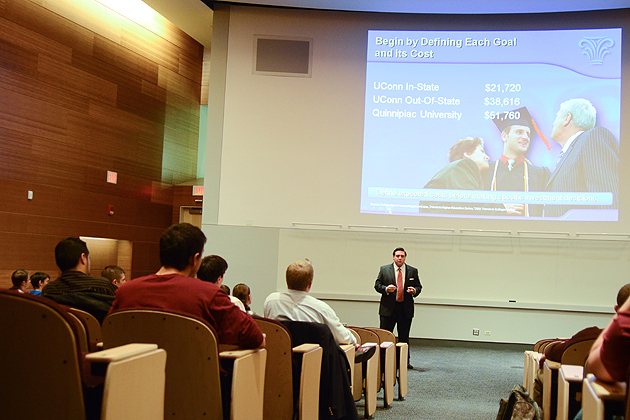
The executive director of the Business School’s Career Center is very clear about one thing.
“It’s not my job search. It’s not my team’s job search. It’s [the student’s] job search. We get them the information they need, and put them in touch with the opportunities that are out there,” says Jim Lowe, who came to the center from private business, the last 10 as a senior vice president for Lee Hecht Harrison, a career counseling firm.
And, if the students put in the effort, Lowe and his team will introduce them to dozens of business executives, offer them plenty of programs, and teach them everything they have to know to land that all-important first job.
We get them the information they need, and put them in touch with the opportunities that are out there.
It’s working: more than 75 percent of the Business School’s undergraduates in the Class of 2011 who responded to the annual placement survey were offered jobs within three months of graduation. Another five percent were heading to graduate school. The center also helped place 87 percent of graduate students, and in both 2010 and 2011, every MBA student had a paid internship in place between their first and second year in the program.

One of the center’s successes is John DesRochers, who works in commercial mortgage-backed securities at RBS Global Banking and Markets in Stamford, only about 10 minutes from where he grew up. DesRochers landed an internship at RBS in the summer of 2010 using some of the opportunities offered at the School of Business Career Center (SBCC).
“I worked very closely with Kathy Hendrickson and Ed Song at the SBCC,” says DesRochers. “They really gave me a lot of guidance. They were inspirational, and helped guide my path through school.” So much so that he already is returning to UConn to help other undergraduates work through the job maze.
And DesRochers isn’t alone. Since RBS began recruiting at UConn for the first time in 2010, the company has hired five UConn seniors to their summer intern program. And while RBS recruited from eight core schools – UConn, Yale, University of Pennsylvania, University of Michigan, Duke, NYU, University of Texas, and Georgetown – UConn was the only school among them that had all its RBS interns receive full-time offers from the company.
Monica Pislaru, now working at Pratt & Whitney Global Service Partners, also has praise for the SBCC.
“I’ve been very fortunate to take advantage of the amazing resources offered by the career center, and I have a job I chose by being extremely well informed about many companies and opportunities. I’m very happy where I am today,” she says.
Getting the SBCC to where it is today involved hard work and new staff members. In 2008, the center was run by a staff of three. Since Lowe arrived in September 2010, the staff has grown to seven. And the programmatic offerings for students have expanded, too, and taken several interesting turns. Take, for example, the speed networking event held in late October.
“We had 50 corporate professionals join us,” says Lowe. “The students had seven minutes to sell themselves, then the company representatives would take seven minutes to critique the student’s performance. Each student [more than 100 attended the event] visited seven companies and, when they finished, the company representatives provided global feedback to all the students. It was great fun.”
Earlier in the year, the great-great-grandson of Emily Post offered a presentation on etiquette that involved not which fork to use for salad, but how to behave in a business setting.

The SBCC also altered the tried and true 60-minute company lecture, instead instituting a weekly 30-20-10 program: 30 minutes discussing a contemporary employment topic, a 20-minute presentation by that evening’s employer, and a 10-minute Q&A. After the set program, students and the company representatives enjoy a one-hour networking event, with refreshments sponsored by that night’s firm.
“Students today don’t want to sit through a one-hour lecture telling them why they should work for company X and giving them information they could access themselves through the company’s web site,” says Lowe. “This mixes it up; they explore what’s going on in the world and at the company. It’s much more interesting.”
The SBCC’s main goal is to form more relationships with what Lowe calls “key” partner companies, which helps drive placement by connecting students to firms who have a desire to work closely with UConn.
“These are employers of choice for our students, so we work hard to reach out, connect with them,” Lowe says. “And these companies realize they need a pipeline, and they’ve done well with UConn students they’ve hired in the past, often making reference to the strong work ethic of our business students.”
The relationships go full circle. Once UConn alumni reach top administrative positions at the partner firms, the SBCC team brings them back to campus to help current generations of students. Or, in one case, three alumni decided to give back to the University and, with Lowe’s help, set up a mentoring program where working alumni come to campus for a meet and greet, dining with students and sharing their expertise and experience to help them focus their study plans and career choices.
All of the center’s programs – there are at least a dozen – mesh into a complete package that, Lowe and his staff hope, will give every student what they need to find a job in their field, even in a tough economy.
“At the end of the day, if our students don’t get jobs, have we done our jobs? That’s a good question,” he says. And, so far, it’s a question Lowe hasn’t had to answer.



